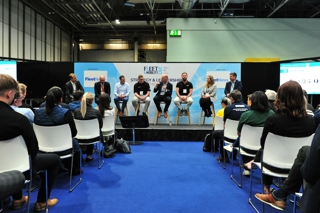Hundreds of thousands of company cars and vans are standing idle as fleets feel the full force of the coronavirus pandemic.
Almost three-quarters (72.6%) of respondents to a Fleet News survey said less than 10% of their company cars are being driven for work.
Any semblance of normality was reserved for just one-in-20 fleets, which said more than 75% of their company car drivers were still on the road.
The impact on van fleets is equally significant, but, due to increases in demand from different parts of the economy, such as home deliveries, fewer vans as a proportion of overall fleet operations are standing idle, the research suggests.
Nevertheless, two-thirds (66.7%) of respondents said that less than 10% of their van drivers were working, but almost one-in-five (18.8%) said between half and three-quarters of their drivers were on the road. One in 10 had more than 75% of their van drivers operational.
One fleet manager told Fleet News he had mothballed half his fleet due to a lack of work, while another had de-hired all unused vehicles and arranged rental holiday for leased vehicles.
Payment deferrals have also been discussed with funders in the event of extended movement restrictions.
The Government lockdown, introduced on Monday, March 23, has resulted in an estimated nine million employees being furloughed. Many of those still in work, meanwhile, are working from home.
An overwhelming majority of fleet decision-makers – close to three-quarters (73.4%) – said they were working from home; one in 10 were dividing their working day between the office and home, and just 15.4% were still in the office full-time.
‘BENEFIT’ QUESTIONED
The number of employees being furloughed or working from home has called into question the fairness of paying company car tax on a ‘benefit’ that may be standing idle.
Currently, unless a company car is unavailable for 30 consecutive days and is available to the same employee before and after the period of unavailability, it is liable to benefit-in-kind (BIK) tax during the whole period.
HMRC told Fleet News the benefit charge applies where a car is made available for private use, whether or not it is so used.
A spokesman said: “A car kept on an employee’s driveway during a period of furlough would still be considered to be made available. Neither would we accept a SORN declaration as proof of unavailability.”
Ordinarily, a car would need to be handed back to the employer so it cannot be used. However, HMRC says it recognises under the current circumstances it may not be possible to physically hand the car back.
The spokesman said: “We would accept that where all the keys (or tabs) are in possession of the employer, and the employee does not have the authority to request the keys are returned to them, the car would be unavailable.”
However, no official guidance has been published and the suggestion around sending keys back could create major problems for fleets.
The Association of Fleet Professionals (AFP) says it has already heard reports of employees pushing their keys back through the letterboxes of unattended offices.
Not only does it make it impossible for fleet decision-makers to create an audit trail to satisfy HMRC, but it could also create a health safety problem if a car needed to be moved in an emergency and the keys were not readily available.
OPERATIONAL IMPACT
Vehicle deliveries and collections have also been halted, with leasing companies working with fleet decision-makers to extend contracts, where possible, and mitigate potential charges incurred during the Covid-19 pandemic.
However, they say they are continuing to support vehicle deliveries for frontline essential services, public sector customers and key workers.
Customer service teams are working from home and are available to assist fleets, while vehicle orders can be made online, but the industry says it recognises fleets will need help negotiating the crisis.
Tim Buchan, chief executive of Zenith, said: “We are operating as near to normal as possible. Customers are still able to order vehicles and speak to our team for any assistance they might need.”
Customers and their drivers are being kept up to date, with regular communications on everything from vehicle availability to servicing and maintenance, explained Buchan.
“Everyone at Zenith understands how important our role is in keeping fleets operational and we’re doing everything we can to support them all at this time.”
Nick Brownrigg, Alphabet’s CEO, told Fleet News he understood that Covid-19 is an “unprecedented, concerning and difficult time” for everyone in the UK.
Customers that may have an issue with their payments as a result of coronavirus should call to discuss their concerns as soon as possible, he said.
“We have a range of options available – such as the rescheduling of payments – which enables us to tailor a solution to the precise circumstances of the business and the types of contract on which the fleet operates.”
He continued: “This is an incredibly difficult moment for many businesses in the UK; however, fleet decision-makers should also remember that there are contractual and regulatory obligations for leased and financed vehicles.”
Fleets are also being directed to the relevant Government websites and online resources, which detail potential grants and support available to businesses.
Almost a third (29.2%) of fleets say they have negotiated vehicle contract extensions with their provider. Brownrigg said, if they have less than three months left on their contract fleets and drivers are being contacted to discuss their options.
He added: “For customers with vehicles on contracts with beyond three months to run, we are recommending they continue to run to their normal renewal cycle, unless there is a specific request for a contract reschedule.”
Hitachi Capital Vehicle Solutions, like many other leasing companies, is taking a similar approach. Managing director Jon Lawes said: “We’ve been contacting all of our customers with vehicles due for renewal in the next six months to offer them the ability to extend their contract.
“This has been done on a case-by-case basis to ensure we consider the most appropriate option for each and every driver.”
LeasePlan UK is also currently working on extending the contracts of its customers, including key workers, to keep them as mobile as possible.
Attila Dobos, operations director at LeasePlan UK, explained: “We are offering a number of options for our customers to choose from, designed to cater to their individual needs and personal circumstances.
“These include formal and informal extension agreements. If neither option is suitable, we are asking customers to get in touch with us directly where they can discuss further options with our dedicated customer services team.”
To help any service, maintenance and repair (SMR) needs during the crisis, Hitachi Capital Vehicle Solutions set up a dedicated operations incident team to contact every supplier across its network, before the nationwide lockdown was announced.
It has contacted repairers that cover 84% of its essential services and critical vehicles, of which 83% repairers are available.
“Our focus remains on making sure we can react to any fluidity within our supplier network – be that sourcing alternative garages or recruiting new suppliers,” said Lawes.
“Our teams are also busy maximising workshop availability, with fleet’s compliance and uptime our main priorities. As a result, fleet availability is 99.5% across our customer base.”
At Alphabet, Brownrigg said SMR bookings should only be made if they are “absolutely necessary”. However, he added: “If customers have designated key workers that need to remain mobile, we’re asking them to contact us so we can ensure their continued mobility, despite the restrictions and challenges.”
Arval UK has also adopted new SMR procedures to support a number of key businesses, including some of the UK’s largest pharmaceutical and medical supply companies.
Corrine Barton, UK head of networks at Arval, explained: “We are having to find service and maintenance suppliers that remain available for essential work, and then schedule jobs so that downtime is kept to an absolute minimum. Getting this right can literally save lives.” (For more on the SMR impact, click here).
RESIDUAL VALUES
The long-term impact on the fleet industry remains unclear, but undoubtedly the length of the lockdown will play its part.
Andrew Mee, head of forecast UK at Cap HPI, said: “In the short term, when a lockdown of hopefully only a few months starts to be released and the new and used car markets start to come back to life, there is the potential for reasonably steady residual values.
“This should be the case if the impact on consumer confidence is of limited and pent-up demand is met by a fairly sluggish used supply of ex-fleet and ex-PCP vehicles constrained by the logistics of vehicle collections, inspections and movements to disposal channels.”
Following this, Mee believes a shortfall in new car supply as manufacturers struggle to re-establish supply chains may make late plate and low mileage used cars very attractive, and good values for these will ripple down to support values of older cars.
“On the other hand,” he said, “a longer lockdown is likely to have a much more negative effect on the economy, and people’s jobs, personal wealth and disposable income. This could see used car supply outweigh demand and so result in a medium- or long-term fall in used values.”
An inevitable fall in new car registrations in 2020, however, could affect used car supply in future years, contributing to future used value recovery.
Caroline Sandall, co-chair of the Association of Fleet Professionals (AFP), says the impact of coronavirus and the ensuing lockdown has been dramatic, but the fleet industry can be proud at how it is playing its part in supporting frontline services and key workers. Read more here.






















Login to comment
Comments
No comments have been made yet.